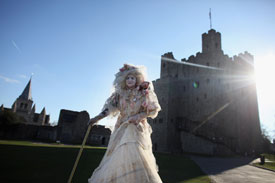£2.7m fund to ‘bring history alive’
The government is to give English Heritage £2.7m to help encourage schools and children to visit local historical sites more.

The scheme is to help inspire schoolchildren about England’s “rich island history”. Education Secretary Michael Gove wants children to visit local historical sites to help them see the national picture.
English Heritage plans to use the money to recruit staff with a background in teaching and history to work with schools and focus on local heritage sites.
Mr Gove said that visiting local historical sites would “bring history alive” for children.
He used the example of schoolchildren in King’s Lynn, Norfolk, who could see the remains of the Franciscan friary, shattered by the Reformation, and visit the great Tudor pilgrimage chapel used as a gunpowder store during the Civil War.
He said children could also explore the Restoration hotel The Duke’s Head, which was built to register support for James, Duke of York, during the exclusion crisis, and visit the dock from which explorer George Vancouver sailed to Canada.
Mr Gove said: “All of these are the physical remains of the rich, controversial and thrilling story of England. All belong to the people locally, and local children who visit them will be inspired to delve further.
“We have a rich island story, which can be brought to life by seeing our historical and heritage sites.”
Simon Thurley, chief executive of English Heritage, said: “Outside every school there is a rich history. In the high street, the housing estate, the park, riverside and field, every town, city and village is full of places in which significant events have taken place.
“We want every child, their parents and teachers to enjoy and take pride in the heritage of their local area and to understand the part it played in the rich story of England.
“Our Heritage Schools initiative will bring history to life both in the classroom and out of it, weaving it into the life of the community and endowing present and future generations of children with a vivid understanding of the place in which they grew up.”
The Department of Education also hopes that the initiative will encourage schools to work together in the run-up to the 100th anniversary of the First World War, and identify servicemen who lived in their area.
-
Latest news
-
Laughing Boy: New play tells the tragic tale of Connor Sparrowhawk5m

-
Sewage warning system allows some of worst test results to be left off rating system, analysis shows3m

-
Post Office inquiry: Former CEO didn’t like word “bugs” to refer to faulty IT system4m

-
Israeli soldier speaks out on war in Gaza12m

-
PM’s defence spending boost should be ‘celebrated’, says former Armed Forces Minister4m

-




